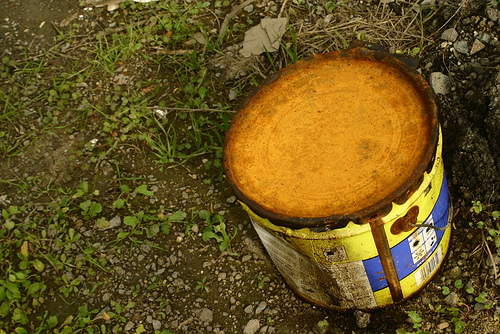Laurie Halse Anderson's Blog, page 17
August 12, 2011
WFMAD Day 12 – Covered in Paint

Because, seriously, I am. Covered in paint, I mean. I have been painting for the past 10 hours. No, not an artistic masterpiece. I'm painting the mudroom.

It was very therapeutic. And a good thing to do while I was waiting for the Internet to come back online.
Ready… Before your start your 15 minutes of writing today, jot down three unfinished projects in your life. Then pull out your calendar and pencil in the dates when you will finish them.
Set… "Every artist dips his brush in his own soul, and paints his own nature into his pictures." Henry Ward Beecher
Today's prompt: This is deceptively simple. All you have to do is to write out three short lists. Don't think about this too much; go with your gut.
List #1 – Write down your top five values.
List #2 – Write down the five things (other than sleep) that take up most of your time.
List #3 – Write down the ways that Lists 1 and 2 coincide and the ways in which they differ. What does that mean for your happiness? For your writing? What specific things can you do between now and the end of the year that will make these lists completely reflect each other?
OR – have your main character write out these lists.
Scribble… Scribble… Scribble…

August 11, 2011
WFMAD Day 11 – Marking Time

I saw a lot of early autumnal hints on my run this morning. Dark, low clouds scuttled from Lake Ontario to the Tug Hill Plateau like hungry crabs. The first small flock of geese passed overhead, either going for a test flight, or intent on getting south early so they'd have the best condo choices. A few sumac bushes have flared red and brilliant orange. The corn down the road from us is fully two feet taller than I am. And as I trudged up the driveway, a huge collection of robins had gathered on the lawn, arguing about those geese and whether they were prudent or crazy.
That is what early August feels like around here. (Attn: SCBWI conference participants… add this to the reasons of why you should move here!) Part of why I love living in the country is that it is easier to stay connected with the natural flow of the seasons than in, say, Los Angeles.
This got me thinking about how we show the passage of time in our books.

(Thinking about time always makes me long for a Weasley clock .)
The way your narrator describes the passage of time can be a wonderful tool that will show your readers how the narrator's mind works, and give a sense of that person's world. If you find ways to mark time other than the conventional "two weeks later," or "On Monday," or "after several hours," you can create a much more interesting story, and sneak in contextual clues.
The early drafts of SPEAK were loaded with the conventional time markers. So much so that my editor gently suggested that I find a more creative way to let readers know that time was passing. That's when I hit on the idea of using school holidays as a marker; those chapters that are built around Halloween, Thanksgiving, Christmas, and Valentine's Day were all inserted to help the reader figure out where Melinda was in the school year. (The use of semester breaks and report cards had been in the story from the first draft.)
Ready… Yes, that is Autumn tapping her watch and telling you to get a move on. Winter is lined up right behind her.
Set… "The scariest moment is always just before you start." Stephen King
Today's prompt: How does your character measure the passage of time? The seconds? The hours? The days and years? Does she measure the time it takes for her mother to get out of bed on Saturdays by the number of cartoons she gets to watch? Or does she mark the days of the week according to what is being served in the cafeteria? List as many as you can in fifteen minutes.
OR!! Come up with a list of creative ways that YOU secretly measure time! What do they say about you?
Scribble… Scribble… Scribble…

August 10, 2011
WFMAD Day 10 – Reaching for New

I am reading The Plague of Doves, by Louise Erdrich (which I recommend highly, btw!) and am struck by the layers and layers of storytelling that Louise presents to the reader and the number of narrators of these layered stories.

Louise nests these stories one inside the other with incredible skill. (I have no idea exactly how she does it, so don't be waiting for a blog post about it) One of the many things I like about her style is her use of narrators from different time periods, narrators who are usually related to each other.
And then I realized that this was the foundation for a great WFMAD prompt!
Ready… Dig out a family album and locate a photo of someone from an earlier generation. It's best if you don't know too much about this person. OR Use this Google image search to find a photo that touches a nerve with you, for whatever reason. You'll keep this photo in front of you as you write.
Set… "Fiction is the truth inside the lie." Stephen King
Today's prompt: Launch from that photo and write for fifteen minutes. Start with a family story, if you want, but do NOT tell the official version of the story. Make up the unofficial version, the one that your character in the photo knows. Let the voice of someone you know, but you don't know, carry away your imagination. Bonus points – find a way to weave this person and his story into your Work In Progress!
Scribble… Scribble… Scribble…

August 9, 2011
WFMAD Day 9 – Movement

If you are writing a plot-driven book, one in which the main character's journey is largely a response to exterior forces (Harry Potter, Hunger Games) then you will rarely be at a loss to decide what kind of action a scene can contain.
(CAVEAT – except for when you hit those "quiet" scenes that pacing requires every once in a while. At that point, you'll want to pay attention to the rest of this post.)
Character-driven novels (Speak, Wintergirls) have fewer Big Dramatic Externally-Driven Turns of Plot. And more scenes in which the characters move the story forward by dialog. However, page after page of dialog with little action sends a lot of readers to sleep. (Barry Lyga and I have an ongoing disagreement about this, btw. Ask him about it the next time you see him.)

image copyright Anita Kunz
My argument is that talking heads on the page are just as boring as talking heads on Sunday morning talk shows. More importantly, they are a missed opportunity. With a just a few lines of action, you can add layers of depth to a scene. Likewise the strategic insertion of a character's thoughts, or timely setting or sensory details. Why would you chose to portray a scene like this in one color when you have the entire palette at your fingertips?
Ready… This is Week 2. Before you start writing, give a gentle reminder to anyone who might interrupt you that all you are asking for is fifteen minutes of peace and quiet. And that you deserve it.
Set… "Change means movement. Movement means friction. Only in the frictionless vacuum of a nonexistent abstract world can movement or change occur without that abrasive friction of conflict." Saul Alinsky
Today's prompt: Write down five scenes in which your character will engage another with a great deal of dialog. Quickly jot down what the purpose of the dialog is, and how it will move the story forward. (This should only take a line or two.)
Then for each scene, try to come up with an action that the characters can engage in while talking to each other. For example: grocery shopping, trying on pants at the mall, looking for lost homework in an overstuffed locker. Extra bonus points if you can come up with an idea for the action that will give the reader further insight into the personalities or lives of one or more of the characters.
Scribble… Scribble… Scribble

August 8, 2011
WFMAD DAY 8 – Exhaustimacated

I am beat. Whooped. Drained of all energy and intelligence. But it was SO worth it!
Yesterday I gave the closing keynote speech to 1300 people at the 40th SCBWI National Conference. To say I was nervous would be an understatement. Some of the best and brightest writers in our field had spoken over the previous three days, including Richard Peck, who somehow managed to surpass his usual eloquence and give hands-down the best speech I have ever heard him deliver.
( Lisa Yee's blog has loads of pics of all the speakers at the conference.)
The speech went well, I think. After it I signed books for an hour or so with a bunch of other authors and illustrators. Then there was a party and a late dinner and you know what?

I have all the energy of a worm that's been baking on a Dallas sidewalk for a week or so.
How can you find the focus or energy to write when you feel this exhaustimacated? (That word, btw, was made up by my husband.)
It's hard, no question about it. And it creates a potentially negative situation, if you say things to yourself like, "I'm going to muscle through this and meet my writing goal for the day. Fatigue is not an option. I will not get out of this chair until I've written five pages, dammit…."
And then, after a couple hours or minutes of staring blankly at the screen whilst your Muse huddles in the corner and whimpers, you start yelling at yourself using really mean names and harsh words, and there is a very good chance you will eat a gallon of Rocky Road ice cream and wake up in seven hours from a sugar coma and feel even worse, if that's possible, than when you started.
But it's August. And you promised yourself you would write fifteen minutes every day. And like I said in my speech yesterday, "Discipline provides the canvas, inspiration supplies the paint. You create the art." So what to do when you are this tired?
Ready… Set a timer for fifteen minutes. When the alarm goes off, if you are not feeling more energized and focused than when you started, stop writing immediately – even if you are in the middle of a word. Pat yourself on the back and take a well-deserved nap.
Set…"Your Muse is you, the very best creative, innocent, eager–to-grow part of you…You need to treat your Muse gently. Surround yourself with the kinds of things that engage your playful, creative side…Hold on to the magic and remember to have fun." Laurie Halse Anderson (from my speech yesterday)
Today's prompt: What smell reminds you of your favorite holiday? Start with the smell and move from that to the source of the smell and the room that you find it in. Write about the visual details and the room, then describe the people of the room; what they're doing there, how you feel about them, what it will feel like when this moment ends.
OR
Respond to the prompt above from the perspective of your character.
Scribble… Scribble… Scribble…

August 7, 2011
WFMAD Day 7 – Adjust your rearview mirror

DAY 7!!!!
How are you doing on your attempts to write at least fifteen minutes every day? What is hard? What is harder? Did you have any unexpected resistance, either inside yourself or from the Universe at large?

I am a huge fan of New Year's resolutions. I know that when I write things down, it helps to focus my attention toward the goals I am trying to achieve. What most people forget to do, though, is to add a degree of accountability to the process. They are so busy moving forward, accelerator smashed down as far as it will go, that they forget to look behind them and take stock of where they've been. And they wonder why they don't learn anything!
Ready… Think about the reward that you deserve for writing this week. Then make plans to actually give yourself that reward in the next 24 hours. Do not punish yourself for the missed days. Reward yourself for the days when you made the time and took the plunge into writing.
Set… "A person is a fool to become a writer. His only compensation is absolute freedom." Roald Dahl
Today's prompt: Pretend it is fifteen minutes to midnight on December 31, 2010. (Pour champagne if it will help evoke the proper atmosphere. Just don't drive anywhere!) You have fifteen minutes to write out your writing intentions for 2011. Don't worry about the first half of the year; it will probably go by in a blur anyway. Start your writing intentions on a random date…. say, August 8th! Write your Big Picture goals for the end of 2011, and smaller goals that you think you can accomplish within each month. Be sure to mark on your calender Check-In Days at the end of each month where you can look back at what you did and did not accomplish. You'll also adjust your goals accordingly on the Check-In Days.
OR
Set a scene with your main character on New Year's Eve three years AFTER the time period in which you set his story. What in the scene will trigger his memories of that time period? How will the events of the story look different to him after three years? How do you imagine he might grow in that time span?
Scribble… Scribble… Scribble

August 6, 2011
WFMAD Day 6 – Self-sabotage

I'm in Los Angeles this weekend at the 40th annual SCBWI National Conference and having a blast. Yesterday I gave an hour-long workshop on the nuts and bolts of crafting a creative life. The official SCBWI blog covered a couple of the high points. (Be sure to read the rest of the coverage of the conference events in the blog ; it's almost as good as being here.)
One of the things that came up towards the end of my presentation was the notion of self-sabotage. When the question was asked, many, many heads nodded. It seems that a lot of us are suffering from self-inflicted wounds to our work and our creative life.

Do you? Do you find yourself pulling yourself back from the brink of success over and over? Is it easier to stay mired in the familiar world of "trying to write" than to take some overdue steps that you know would bring you closer to achieving your dream? Shot yourself in the foot recently?

Yeah. Me, too.
Some experts believe that we self-sabotage when we are actually afraid we might succeed. They suspect that the attention and stimulation that comes with success is somehow linked in the subconscious of vulnerable people with events in their past that were traumatic. Others say it is rooted in our own feelings of worthlessness. If you've been emotionally abused, it can be hard to break free of those scars and believe that you actually deserve the life you dream of.
I know a lot of writers who prefer the comfort of the known over the discomfort of the unknown; even when the known circumstances are the state of remaining unpublished, and the unknown is what would happen if they were published and they were able to fulfill their creative dreams.
I think that a lot of writerly procrastination is actually self-sabotage. If you don't finish your manuscript, or if there are a hundred "good" reasons why it's not as well-written as you wanted it to be, then you will never have to confront the real pain of rejection, because you've already pulled the trigger on a defense mechanism that you hope will protect you.
This makes perfect sense. It also makes me want to bake you brownies and tuck a comfy blanket around you, because that is a painful amount of fear to be carrying. I suspect some writers of books for kids or teens have a further complicating worry; to write the story that is in their heart, they must confront some of the demons of their own youth. Those people deserve an old friendly dog to snuggle with, in addition to the brownies and blanket.
There is a way to write past these fears.
Ready… Put on the most comfortable clothes you own, and prepare the comfort food that soothes all your hurt feelings. Keep it close by while you're writing. Kleenex might be a good idea, too.
Set… "The demons are innumerable, arrive at the most inappropriate times, and create panic and terror… but I have learned that if I can master the negative forces and harness them to my chariot, then they can work to my advantage…. Lilies often grow out of carcasses' arseholes." Ingmar Bergman
Today's prompt: Write about the absolute worst things that would happen to you if your writing life became wildly successful. What are the best things that would happen? Who benefits if you stay creatively stuck where you are? Why?
OR

August 5, 2011
WFMAD Day 5: Transition

You might not know that I also plan to start competing in triathlons by 2015. (When you are as slow as me, you need to plan these things out in advance.) And my long-long term goal involves outliving all of my competitors so I will – at some point in my 90s – win my age group category.
What does any of this have to do with writing, and making the time to write every day?
Transitions.

A triathlon involves three stages: a swim, a bike race, then a run. (Distances of each leg vary, depending on the race and how crazy the participants are.) The photo above shows racers emerging from the water. They strip off their wetsuits in the transition area, then get on their bikes and take off pedaling.

Transition areas are often filled with thousands of racers. (It can be a real zoo.) After the bike leg of the competition, racers have to properly stow their bike on the rack, take off their helmet, change clothes and shoes, and head out on a long run. Racers prepare and train for smooth transitions just as they train for each of the three events.
That same principal comes in handy when you are trying to make daily writing a regular habit. You're probably pretty good at writing for three or maybe four days in a row, but then life intervenes. The weekend hits. Your in-laws show up. The kids are home on break. Your boss demands you work overtime. The dog gets a stomach flu. Termites eat your walls. The zombie apocalypse begins.
Next thing you know, you've fallen out of the habit of writing. AGAIN. And you beat yourself up about it. And you find it even harder to start again, because you know that something else will pop up and derail your carefully laid plans.
Not necessarily, my friends.
All you need to do is to plan for transitions, those short moments in which you have to shift gears quickly and not lose track of your writing goals. And that's what today's prompt will help you do.
Ready… Get out your calender and make note of events that are scheduled to occur in the next three months that will likely make it hard for you to squeeze in your daily writing. If shifting gears when the weekend hits regularly creates problems for you, make a note of it. Likewise any upcoming birthdays, or other commitments.
Set… "Other people's interruptions of your work are relatively insignificant compared with the countless times you interrupt yourself" Brendan Francis To that I will add, "You have little control over the interruptions to your writing routine. You have total control over how you react to them."
Today's Prompt: You are going to develop your transition strategy for surviving the annoying interruptions to your best-laid plans that life conspires to throw at you.
Come up with a list of 15 ideas (Get it? One item for each minute of your writing today – think fast!) that are quick, rewarding, writing-related things you can do when your schedule is unavoidably messed with. These might be related to your Work In Progress, but should not be critical to it. For example, you could map out the town your character lives in. Or brainstorm elements of her backstory. Come up with a list of her favorite songs, or the recipe she wishes her grandfather would teach her to cook. Write out alternative endings for your book, or possible changes to the major decision points.
OR
You could write a list of 15 writing ideas that are NOT related to your Work In Progress. Write a poem about the smell of your brother's feet. Journal about the first dead body you saw. Compose a country and western song about the the dreaded Japanese beetle.
The trick is to prepare these lists ahead of time and that the tasks on them are very specific. This ensures that in those few moments you are able to steal when the in-laws show up, or while your beloved partner is beating off the zombies with a chainsaw, you won't waste any time wondering about what you should be writing, you will actually be writing.
Questions?
Scribble… Scribble… Scribble…

August 4, 2011
WFMAD Day 4 – Think Big, Write Small, pt. 2


The most important thing is the easiest: write for fifteen minutes today and tomorrow and for about 27 days after that. Many of this year's participants are teachers, some of whom are already headed back into the classroom. KEEP WRITING!! You only have to do it for fifteen minutes a day until the end of the month. Think of how much you are learning about writing that you can share with your students!
Back to Think Big, Write Small. ::adjusts glasses::
When writing a novel or novel-length piece of work, you need to keep one eye on the Big Picture; the grand arcs of your story, whilst keeping the other one on the smallest possible details that will allow each scene to carry the strongest impact possible.
This can give you a headache.
I sketched out my notion of the Big Picture on Tuesday . Today we focus on WRITING SMALL. Pick up a book that you adore and flip to a memorable scene. I'll bet you a cheeseburger that the author made very deliberate choices in the details she used. (If you want, go through and highlight some of these choices.) These little decisions; the fabric of a character's skirt, the memorabilia on a dusty shelf, what she puts on her salad, her choice of taking a taxi or the subway – they all serve a number of purposes. Details given nuance to a story, they help the reader experience the world of the characters, they move the plot forward and they can give insight into a character.
That's a lot a work for small tidbits of information!
Ready… "As great scientists have said and as all children know, it is above all by the imagination that we achieve perception, and compassion, and hope." Ursula LeGuin
Set…Find a place to write where you are guaranteed you will not be interrupted for your fifteen minutes. Lock yourself in the car, hide in the bathroom, put on a disguise, find a new coffee shop, and sit with your back to the rest of the world. By any means necessary, carve out your fifteen minutes and protect them with your life.
Today's prompt: Choose one of the following.
1. Take a chapter from a favorite book. Identify which details are mission-critical. Rewrite a couple paragraphs and change the details to the point where it impacts the rest of the book. If you have a Work in Progress (WIP), you can do this to one of your own chapters.
2. Write a rough draft of a scene set in a middle-school cafeteria. Have your character go through the lunchline. The kid in front of her is mean and nasty. The kid behind her is much kinder, but is afraid to show it, for fear of bringing the wrath of the bully down on her head. Brainstorm the Write Small details you could use in a scene like this to set the scene, move the plot forward and give us a sense of who the main character is.
Scribble… Scribble… Scribble!

August 3, 2011
WFMAD Day 3: Pit of Despair

This will be a crazy day for me. (Update: It HAS been a crazy day!) I leave for the SCBWI National conference tomorrow, so today involves laundry, packing, cleaning, more work on speeches and an entire page of various and sundry errands. My short writing break is not listed on my MUST DO!! list. It is on the much shorter "want to do" list. That is a critical distinction.

I was going to finish the "Think Big, Write Small" post today, but a comment from yesterday took me down a detour, because it was so heartfelt and raw. This is what a
WFMAD participant wrote:
THAT, my friends, is why we write; to find our truth. Even when the truth is sucky because it contradicts what we want to believe about ourselves. I completely understand what this writer is feeling. I have been stuck there many, many times. (I suspect everyone who writes for a living runs into this.) She is a writer lost in a soul-draining fog. She's out of balance. The thing that would help her recenter herself is the thing that feels the hardest: writing.
When I'm stuck in this kind of Pit of Despair, journaling helps me build a ladder that I can use when I'm ready to escape. I write about what's making me feel bad, mad, sad, and scared. I vent big time about the conditions of my life. I can go on for page after page after page (this can take days, weeks, or months) and then, finally, the fog lifts. I find my rhythm, my voice. Inspiration is everywhere. I see interesting conflicts I want to develop and I can hear the characters. I have once again broken through that chainmail veil that separates this reality from the world of pretend. I feel like a writer again. The woman who wrote the question will feel like that very soon, as long as she's willing to write about her struggle first.
Ready… Take a moment of gratitude. Be thankful that you've found the courage to follow your dream, even though it feels scary.
Set… Make sure your pets have done their necessary business outside, and any infants in your house are fed, dry, and comfy. Make sure that you are fed, dry, and comfy, too!
Today's prompt: Write for fifteen minutes about what gets in the way of your writing. Write a detailed scene about a time you wanted to write, but then [fill in the blank] happened. Why did you let that happen? What could you have done differently? How can you prevent that from happening again?
OR
AND/OR




